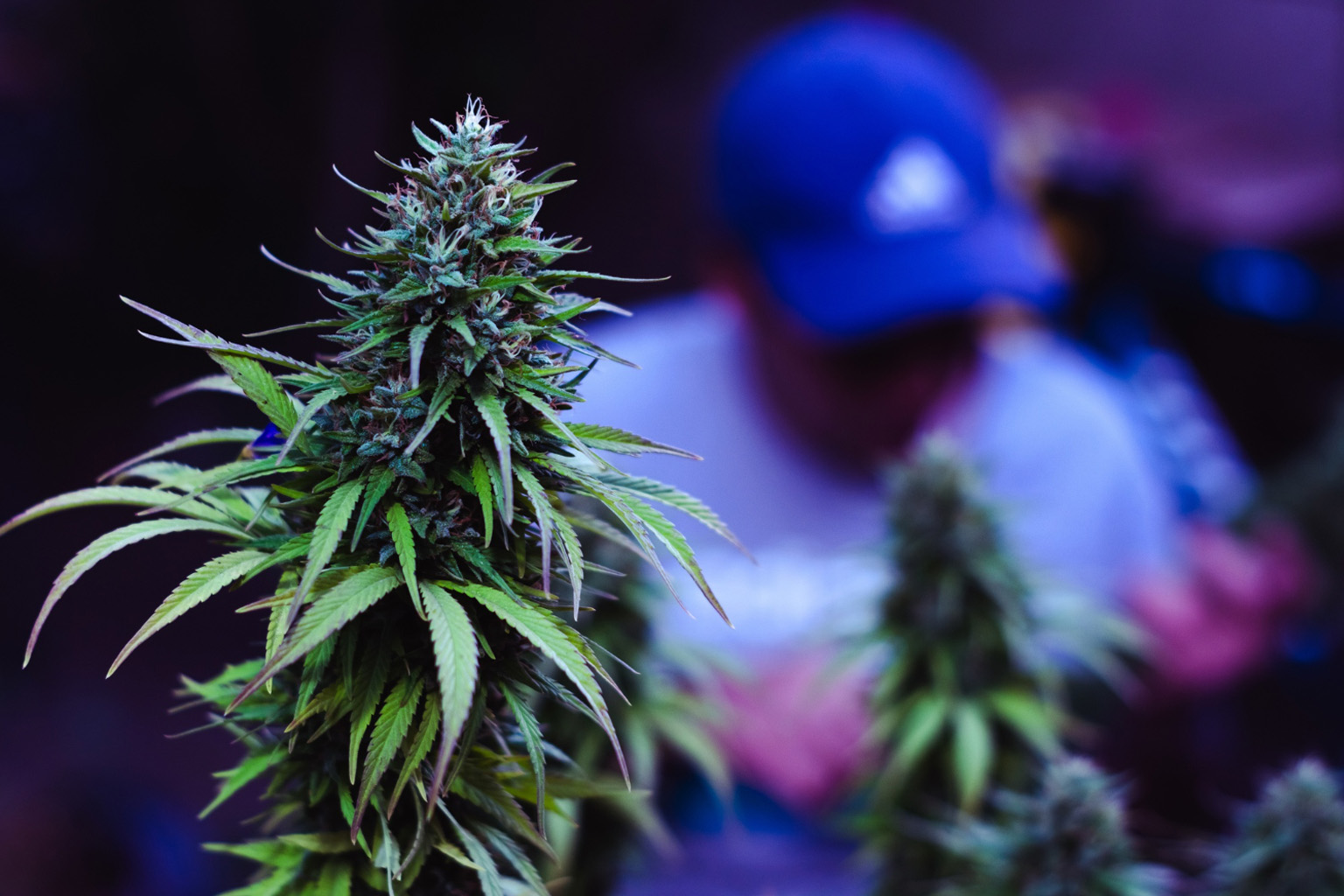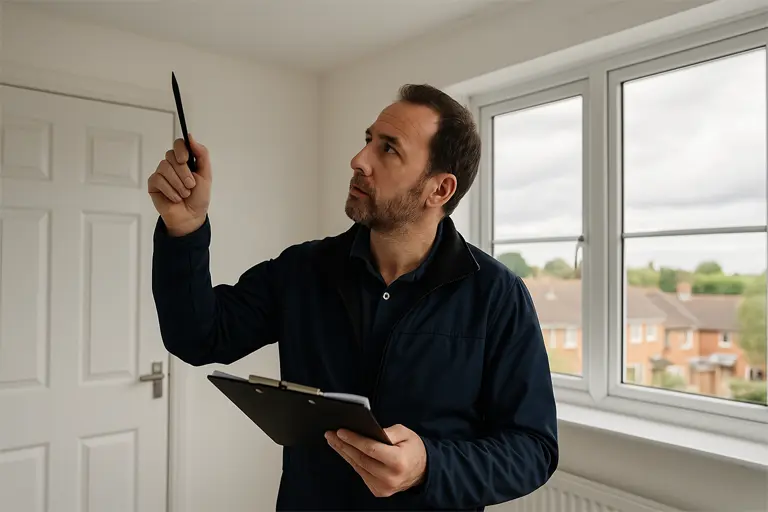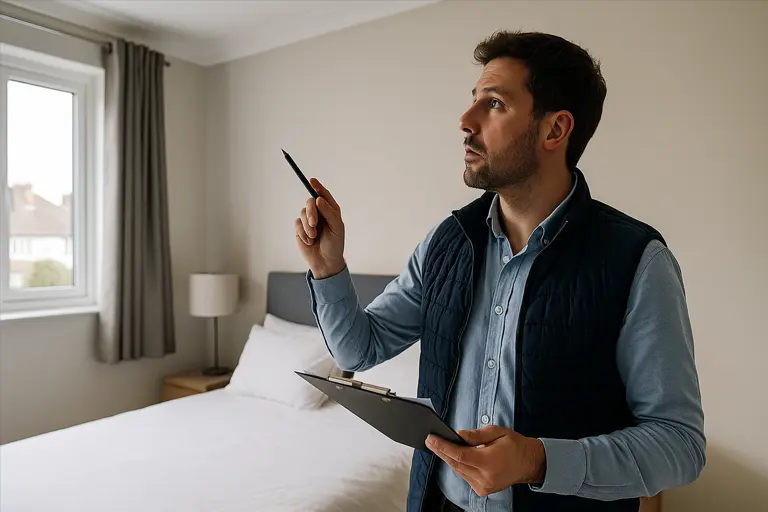A Hidden Risk in Plain Sight
From the outside, everything looks normal. A well-kept terraced house, rent paid on time, no complaints from neighbours. But behind closed doors, and often up in the attic, a growing number of UK rental properties are being converted into illegal cannabis farms.
It’s a growing problem across the country, with Greater Manchester Police alone uncovering over 400 cannabis farms between May 2024 and April 2025. The impact? Thousands of pounds in damage, increased fire risk, denied insurance claims, and in some cases, legal scrutiny for landlords who failed to spot the signs.
In this guide, we’ll break down the issue, the risks, and most importantly, what landlords and letting agents can do to protect their properties, their tenants, and themselves.
Organised crime groups have shifted tactics. Instead of risking large, centralised grow operations in remote industrial units, they now favour smaller, low-profile cannabis farms in everyday residential streets. It’s an approach that’s harder to detect and offers lower risk for the criminals involved, but far greater risk for landlords.
Rental properties provide the perfect cover. A signed tenancy agreement, a compliant-looking tenant, and a standard deposit is often all it takes to gain access. Within days, criminal gangs can convert entire rooms into high-powered grow spaces using tampered electrics, blacked-out windows, and dangerous ventilation setups. And in most cases, the landlord won’t know until it’s far too late.
The appeal for organised crime lies in decentralisation. One property raided doesn’t jeopardise the wider operation, and by rotating properties regularly, they stay one step ahead of enforcement.
According to Total Landlord Insurance, approximately 90% of cannabis used in the UK is supplied from farms operating within rented homes, highlighting the significant role rental properties play in this illicit industry.
Furthermore, statistics indicate that more than a million cannabis plants, with a street value of £210 million, are seized by the police each year, underscoring the scale of the problem.
Landlords may have no idea anything is wrong until the police break down the door.
Why It’s a Problem for Landlords
While tenants are responsible for their actions, landlords are often left to deal with the aftermath of criminal activities. Unfortunately, ignorance of what’s happening inside the property is not a defence in the eyes of insurers or, in some cases, the law. The presence of a cannabis farm can be financially and legally devastating for a property owner.
Here are the key risks landlords face:
🔥 Property Damage
Cannabis cultivation operations often involve extensive structural modifications to create optimal growing environments. This includes removing walls, drilling holes in ceilings for ducting, installing high-wattage lighting systems, and overloading electrical circuits, all of which can result in significant and costly damage. It’s not unusual for properties to suffer from extreme damp, mould, or even fire damage.
🚫 Insurance Refusal
Many landlords assume their insurance will cover any property damage, but this is far from guaranteed. Insurers regularly deny claims if there’s evidence the landlord failed to carry out regular inspections or demonstrate due diligence. In fact, most landlord policies include clauses about illegal activity, and if insurers find the property was being used for criminal purposes, they may void the policy entirely.
A report from Total Landlord Insurance shared a case where a claim for £44,289 was submitted after tenants turned the property into a cannabis farm. The damage included mould, rewiring, and destruction of walls. Without documentation of inspections, landlords are at risk of footing the entire bill themselves.
🧨 Fire and Safety Hazards
Tampered electrics, bypassed meters, and high-energy grow equipment create serious fire risks, not just to the property, but to neighbouring homes. A single fault can result in a house fire, leading to injury or loss of life. This exposes landlords to potential legal liability if it’s shown they didn’t take reasonable steps to inspect and maintain the property.
⚖️ Legal and Reputational Consequences
Landlords can face legal scrutiny if it appears they neglected their duty of care. Even if prosecution is unlikely, civil claims and reputational damage are very real risks. Local authorities may also place properties under increased scrutiny, making future lettings more complicated.
📉 Decreased Property Value
Properties that have been used as cannabis farms are often stigmatized, even after remediation. This can reduce sale value, scare off prospective tenants, and increase time on the market.
| Risk Type | Example Impact | Estimated Cost Range |
|---|---|---|
| Fire Damage | Electrical fire caused by tampering | £10,000 – £50,000 |
| Insurance Rejection | Claim denied due to lack of checks | Full cost to landlord |
| Structural Damage | Walls removed or ceilings collapsed | £5,000 – £20,000 |
| Legal Liability | Failure to demonstrate due diligence | £1,000+ in legal fees |
| Loss of Rent | Eviction process and property remediation | £2,000 – £10,000 |
| Reputational Damage | Letting agent or public reviews | Long-term letting impact |
In short, cannabis farms are not just a problem for the police, they’re a serious and growing threat for landlords who fail to maintain a proactive approach to property management.

Warning Signs to Look Out For
Cannabis farms are deliberately hidden in plain sight, which makes early detection difficult. Criminal tenants go to great lengths to conceal their activities, meaning landlords must be proactive, vigilant, and well-informed.
While some signs may be subtle, there are consistent patterns and physical clues that experienced inspectors are trained to spot. Identifying these red flags early can be the difference between a simple tenant issue and a property disaster.
Here are the key indicators every landlord should be aware of:
🪟 Windows That Are Always Covered
Blacked-out windows are a classic sign. Tenants may use foil, blackout blinds, or boarded-up windows to conceal bright grow lights. If you notice windows that remain covered day and night, or there’s no sign of normal daily living (curtains, ventilation), it’s worth investigating.
🔌 Electrical Meter Tampering
Cannabis farms use vast amounts of electricity. To avoid detection and high bills, tenants often bypass the electric meter, creating a serious fire hazard. Signs include damaged or rewired meters, wires running from the street, or attempts to conceal the meter box.
🌬️ Strong Smells and Humidity
The cultivation of cannabis produces a pungent, sweet, skunky odour that’s hard to miss, especially in the final growing stage. Excessive humidity may lead to condensation on windows, visible mould, or peeling paint and wallpaper.
🚪 Restricted Access to Rooms
If tenants consistently deny or delay access to certain rooms, especially the loft or spare rooms, this should raise serious concerns. Gangs often restrict access to protect crops or growing equipment.
🔊 Constant Buzzing or Fan Noises
Grow operations require continuous ventilation and lighting. This means the presence of fans, heat lamps, and extraction systems which create a constant hum or buzzing sound, sometimes audible from outside the building.
🧴 Chemical Smells or Deodorisers
To mask the cannabis odour, tenants may use excessive air fresheners, incense, or chemical sprays. A strong and unnatural smell in multiple areas of the home is often a red flag.
👥 Suspicious Tenant Behaviour
Criminal tenants may seem overly private, use false identities, or pay several months’ rent upfront. A sudden shift in communication patterns, missed appointments, evasive answers, or constant delays, can be a warning of illicit activity.
| Warning Sign | What to Look For | Why It’s a Red Flag |
|---|---|---|
| Blacked-Out or Covered Windows | Curtains always closed or reflective sheeting inside | Hides strong lighting used for growing plants |
| Strong or Unusual Smells | Persistent cannabis smell or excessive use of air fresheners | Indicates cultivation and attempts to mask odours |
| High Humidity or Mould | Mould around vents, walls damp to the touch | Result of indoor growing equipment and lack of ventilation |
| Tampered or Bypassed Electrics | Loose wires, broken sockets, or interference with meter | Used to steal electricity and power grow lights |
| Unusual Tenant Behaviour | Rarely seen, pays in cash, refuses access for inspections | Trying to avoid detection and hide criminal activity |
Many landlords assume that their agent or tenant will alert them to issues. But when it comes to organised cannabis cultivation, those assumptions can cost you dearly. Routine and professional inspections remain the most reliable way to detect the signs before serious damage occurs.
professional Property Inspections
Stay compliant, avoid costly surprises, and protect your property from just £30 + VAT.
Get started with a free consultation today.
Why Routine Property Inspections Are No Longer Optional
The days of relying solely on tenant honesty and the occasional check-in are over. With rising incidents of criminal activity within rental homes, routine property inspections have shifted from a ‘nice-to-have’ to a legal and financial necessity.
Professional property inspections help landlords safeguard their investments, comply with insurance and legal requirements, and most importantly, identify early warning signs of illicit activity before the damage is done.
Here’s why inspections must be part of every landlord and letting agent’s standard practice:
📋 Insurance Compliance
Most landlord insurance policies require proof of due diligence, which often includes regular, documented property inspections. If you can’t show evidence that you’ve been monitoring the condition and use of your property, your insurer may void your policy in the event of damage or illegal activity.
Routine inspections create the paper trail you need to demonstrate that you’ve taken reasonable steps to protect your property.
🔍 Early Intervention
Criminal activity like cannabis cultivation typically escalates over time. The earlier it’s detected, the easier and cheaper it is to resolve. Spotting covered windows, odours, or unusual wiring during an inspection can prompt timely intervention before extensive damage or legal trouble occurs.
🛠️ Property Condition Monitoring
Cannabis farms aside, inspections help catch maintenance issues, tenant negligence, and health and safety concerns that could affect your property’s value or compliance. Identifying a minor issue like damp early on can save thousands in repair costs later.
🧾 Evidence for Legal or Insurance Claims
Should you ever need to evict a tenant, make an insurance claim, or defend yourself in court, inspection reports act as objective, timestamped evidence. Detailed inspection logs can prove that you exercised your duty of care and acted responsibly.
🤝 Professional Relationships
Scheduled inspections also set clear boundaries with tenants. They demonstrate that the landlord is engaged and active, which can deter illegal activity and help maintain open lines of communication with responsible renters.
| Inspection Benefit | Why It Matters |
|---|---|
| Insurance Compliance | Required by most insurers to validate claims |
| Early Detection | Identifies signs of criminal use before serious damage occurs |
| Legal Protection | Creates a record of due diligence and tenant management |
| Property Maintenance | Spots maintenance issues before they escalate |
| Tenant Deterrence | Sends a message that the property is monitored |
| Peace of Mind | Helps landlords sleep better knowing the property is safe |
Routine inspections aren’t just a box-ticking exercise, they’re a crucial part of modern property management. Whether you own a single house or manage a large portfolio, integrating inspections into your schedule can protect your property, your finances, and your future.
Outsourcing Inspections: A Smarter, Safer Approach
While some landlords attempt to conduct inspections themselves or rely on letting agents to manage this responsibility, the reality is that consistent, professional-level inspections require time, training, and documentation that many in-house teams simply can’t sustain.
This is where outsourcing inspections to a professional third-party provider becomes a game-changer.
🔐 Consistency and Coverage
Professional inspection teams follow a rigorous checklist, ensuring nothing gets missed. They can also provide services across multiple locations and property types, making them ideal for landlords or letting agents managing large portfolios or geographically dispersed homes.
📷 Detailed Reporting and Documentation
Outsourced inspections come with digital photo reports, timestamps, and thorough documentation, all ready to support insurance claims or legal proceedings if needed. This level of detail often surpasses what landlords can realistically do themselves.
🧠 Expert Eyes on the Ground
Trained inspectors are better equipped to spot red flags that may go unnoticed by untrained personnel. From identifying suspicious behaviour to detecting signs of tampered electrics or concealed spaces, professional inspectors provide a deeper level of scrutiny.
🤝 Tenant Relationships Managed Professionally
Outsourced inspections can help preserve the landlord-tenant relationship by maintaining a degree of separation. The inspection team becomes the “bad guy,” if necessary, allowing landlords and agents to maintain goodwill while still ensuring compliance and safety.
💼 White-Label Services for Letting Agents
Letting agents can also benefit by offering outsourced inspections as part of their package, either under their own branding or in partnership with the inspection provider. This not only improves service quality but can become a source of additional revenue.
🧘 Peace of Mind and Time Savings
When inspections are outsourced to a reliable provider, landlords and agents gain peace of mind knowing their properties are being checked thoroughly, professionally, and on schedule, without disrupting their own workload.
| Outsourcing Advantage | Benefit for Landlords & Agents |
|---|---|
| Professional Inspections | Trained staff detect issues others may miss |
| Digital Reports | Photo evidence, timestamps, compliance-ready documentation |
| Scalable Coverage | Ideal for portfolios or properties in multiple areas |
| Legal and Insurance Support | Documentation to protect claims and defend actions |
| White-Label Options | Letting agents can brand the service or offer value-added packages |
| Time & Stress Reduction | Reduces landlord admin and workload |
Where cannabis farms, illegal subletting, and property misuse are on the rise, professional inspections are no longer a luxury, they’re an essential line of defence. By outsourcing, landlords and agents can ensure nothing is left to chance.
Property inspection Service
Stay compliant, avoid costly surprises, and protect your property from just £30 + VAT.
Get started with a free consultation today.
What To Do If You Suspect Illegal Activity
Discovering signs of a potential cannabis farm or other criminal activity in your rental property can be unsettling, but how you respond is critical. Acting rashly can put you at legal risk or even in physical danger. Instead, landlords should follow a calm, compliant, and well-documented process.
Here’s what you should do if you suspect illegal activity:
🚫 Do Not Confront Tenants Directly
No matter how strong your suspicions, avoid direct confrontation. Criminal tenants, or individuals connected to organised crime, may become aggressive or violent if they feel exposed. Your safety must come first.
📞 Contact the Police
If you believe a cannabis farm or another serious offence is occurring, report it to the police using the non-emergency 101 number, or 999 if there’s an immediate danger. Police forces across the UK have dedicated teams handling these cases and can act swiftly with the right information.
📸 Document Everything
Take note of any unusual smells, sounds, visual signs (like foil-covered windows), or tenant behaviour. Photographs, timestamped notes, and written correspondence with your tenant can help police build a case and support your own legal or insurance needs.
🧑💼 Notify Your Letting Agent or Legal Advisor
If you work with a letting agent, inform them immediately so they can assist with the correct procedures. You may also need legal advice before entering the property or issuing notices, especially if your tenancy agreement doesn’t provide for routine access.
🔎 Arrange a Professional Inspection
If the situation allows for it legally and safely, book a third-party inspection. This not only provides you with photographic and written evidence but helps confirm whether the situation warrants police action or tenant eviction.
📝 Inform Your Insurer
Let your landlord insurance provider know that there is suspected illegal activity. They will advise you on next steps and note the case on file if damage occurs or a claim is necessary. Timely communication can help preserve your ability to claim.
| Action Step | Why It’s Important |
|---|---|
| Do Not Confront Tenants | Ensures your safety and avoids escalation |
| Contact Police | Puts the issue in the hands of trained professionals |
| Document Observations | Creates a legal and evidential record |
| Notify Letting Agent | Ensures procedural support and professional communication |
| Book Inspection | Provides objective evidence and expert confirmation |
| Inform Insurer | Prepares your case and protects your ability to make a claim |
By following the correct process, landlords can protect their properties, reduce legal exposure, and support the authorities in dismantling organised crime, without putting themselves at unnecessary risk.
Protecting Your Property and Your Peace of Mind
The rise of cannabis farms in rented properties isn’t just a sensational headline, it’s a growing, real-world threat that’s impacting landlords and letting agents across the UK. What makes it especially concerning is how quickly and quietly it can happen: a property that appears completely normal from the outside can be harbouring thousands of pounds worth of illegal activity inside.
But while the risks are serious, the solution is simple: awareness, proactivity, and professional support.
Regular, well-documented property inspections are the most effective way to detect early warning signs, maintain legal compliance, and safeguard your investment. Whether you own one home or a large portfolio, you cannot afford to rely on chance or assumptions. Your insurance coverage, legal standing, and property condition all depend on your ability to demonstrate due diligence.
And the good news? You don’t have to do it all yourself.
By partnering with a trusted inspection service like Leisure Guard Security, you get the peace of mind that comes from having trained professionals regularly assess your properties, spot potential red flags, and keep your paperwork watertight.
Don’t wait until the attic’s glowing or your insurance refuses to pay out. The smartest landlords and agents are acting now, not when it’s too late.
Take the proactive route.
Contact us today to book your next property inspection and make cannabis farms one risk you never have to face.
Frequently Asked Questions About Cannabis & Property Inspections (PIs)
How can I tell if my tenant is growing cannabis in a UK rental property?
Look for signs such as blacked-out windows, constant buzzing noises, bypassed electricity meters, strong smells, and tenants restricting access. These are common indicators of illegal cannabis cultivation in UK homes.
What should landlords do if they suspect a cannabis farm in their property?
Don’t confront the tenant. Document what you observe, contact the police via 101, notify your letting agent or solicitor, and arrange a professional property inspection to verify concerns.
Can landlords be held liable for cannabis farms in their rental properties?
Yes. If landlords fail to carry out regular inspections or demonstrate due diligence, they may face legal scrutiny, civil claims, or be denied insurance pay outs after damage.
Does landlord insurance cover damage from cannabis farms in the UK?
Not always. Most UK landlord insurance policies have exclusions for criminal activity. If you haven’t documented inspections or taken reasonable precautions, insurers may reject your claim.
How often should landlords inspect rental properties in the UK?
It’s best practice to inspect every 3–6 months. Regular, documented property inspections help identify damage, illegal activity, and keep you compliant with insurance terms.
What are the penalties for landlords if illegal cannabis cultivation is found?
While landlords aren’t usually prosecuted, they may face voided insurance, fines for health and safety violations, or be named in civil suits for negligence if harm occurs.
Can letting agents detect cannabis farms during routine checks?
Yes, but only if inspections are carried out thoroughly and regularly. Agents should be trained to spot red flags such as smells, moisture issues, and tenant behaviour changes.
Why is it safer to outsource property inspections to a professional company?
Professional inspectors are trained to identify warning signs and follow legal procedures. They provide detailed, timestamped reports that help with insurance claims and legal protection.
What are the most common signs of a cannabis farm in a UK home?
Covered windows, heat and humidity, electrical tampering, strange odours, excessive use of deodorisers, and secretive tenant behaviour are all major red flags.
How can landlords protect their rental properties from cannabis farms?
Screen tenants carefully, conduct regular inspections, keep documentation, and consider outsourcing inspections to a licensed provider to spot issues early.
Can cannabis grow operations in rented homes affect neighbours?
Absolutely. Bypassed electrics can cause fires, and rival gangs may carry out raids. Tenants in neighbouring properties are often put at serious risk.
What should I do if my insurance claim is denied due to illegal tenant activity?
Seek legal advice immediately. Provide all inspection records and tenancy communications. In future, ensure regular inspections are conducted and documented professionally.
Do I need permission to inspect my rental property in the UK?
Yes. Landlords must give 24 hours’ written notice unless it’s an emergency. Your tenancy agreement should include a clause allowing periodic inspections.
Is there a checklist for spotting cannabis farms in rental properties?
Yes. Many inspection services, including ours, offer free or paid checklists to help landlords identify suspicious signs. Contact us for a printable version.
Are cannabis farms in rented homes becoming more common in the UK?
Yes. Police data shows a significant increase, especially in suburban and city fringe areas. Criminal gangs often target unsuspecting landlords with vacant or unmonitored properties.



